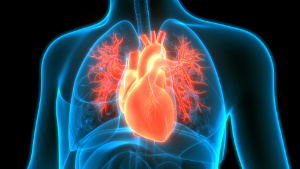Cardiovascular disease in old age may be related to zinc deficiencies
 Seniors have an increased risk of cardiovascular disease, which is the leading cause of death. It is commonly known that diet plays a key role in preventing these diseases, and a team of scientists therefore decided to look closer at zinc because of this nutrient’s many functions in the heart and cardiovascular system. The scientists found that older people often lack zinc for different reasons. Therefore, the dietary guidelines for zinc in old age should be reconsidered with regard to cardiovascular health and other zinc-dependent functions.
Seniors have an increased risk of cardiovascular disease, which is the leading cause of death. It is commonly known that diet plays a key role in preventing these diseases, and a team of scientists therefore decided to look closer at zinc because of this nutrient’s many functions in the heart and cardiovascular system. The scientists found that older people often lack zinc for different reasons. Therefore, the dietary guidelines for zinc in old age should be reconsidered with regard to cardiovascular health and other zinc-dependent functions.
Cardiovascular diseases are an increasing problem worldwide and the risk increases with age. Many seniors suffer from other chronic diseases and take different types of medicine, which increases their need for natural solutions with a preventative effect. Several studies have shown that omega-3 fatty acids, polyphenols, and vitamins are important for our cardiovascular health, but there has not been much focus on zinc, simply because it is commonly believed that zinc deficiencies are rare. However, sub-clinical zinc deficiency may very well be a major factor in ageing and in different types of chronic disease such as atherosclerosis and cancer.
The aim of the new study was to assess the relation between daily zinc intake from the diet and the structure and function of the heart in old people. A total of 251 non-institutionalized seniors with an average age of 80 years participated. The scientists used a special data system to evaluate the participants’ dietary intake of zinc. Afterwards, they analyzed if there was a link between zinc intake and objective heart functions such as:
- LVEF (Left Ventricular Ejection Fraction) that shows how much oxygen-rich blood each heart contraction pumps out of the left ventricle to most of the body's organs
- Left ventricular mass index – because thickening of the left ventricular wall (left ventricular hypertrophy) is common in old age
- TAPSE (Tricuspid Annular Plane Systolic Excursion) that measures the systolic function of the right ventricle
By and large, the researchers could see that participants who got too little dietary zinc had a poorer cardiac function with regard to parameters like LVEF and TAPSE. They also observed that gender, BMI, and the use of betablockers had an independent effect on TAPSE. The scientists therefore recommend a reevaluation of dietary guidelines for zinc intake in old age.
- Cardiovascular diseases are various diseases in the blood vessels and the heart - including atherosclerosis, hypertension, angina pectoris, congestive heart failure, coronary thrombosis, and stroke.
Zinc’s role in cardiovascular health
Zinc supports hundreds of enzymes that are of importance to numerous metabolic processes. It is commonly known that we need zinc for our immune defense and for our skin, wound healing, hair, nails, and bones. With regard to cardiovascular health, the scientists behind the new study mention zinc’s essential role as an antioxidant and its anti-inflammatory properties. Zinc contributes to the protection of blood vessels and the heart by preventing cell damage and atherosclerosis caused by free radical activity. Zinc also reduces the activity of the caspase 3 protein and the cytokine called TNF-α, which counteracts apoptosis (programmed cell death) in the blood vessels and heart. In addition, the researchers refer to studies where zinc has been shown to affect heart muscle contractility by regulating cellular uptake of calcium ions (CA2+) via the cell membranes. The researchers also discovered a positive link between dietary zinc intake and TAPSE, especially among men.
Why do older people lack zinc?
Zinc is primarily found in offal, meat, fish, shellfish, eggs, dairy product, nuts, kernels, and beans. The body’s absorption of zinc from animal sources is better than zinc from vegetable sources. Vitamin B6 is also important for our zinc absorption and utilization.
The reason why many older people lack zinc is that their diets are often not sufficiently balanced and contain too little protein. Many older people also have poor zinc absorption and that can result in a deficiency, even if there is enough zinc in their food. Moreover, lack of vitamin B6, low stomach acid, and the use of diuretics and antacids may impair the body’s absorption and utilization of zinc.
The researchers mention a previously published population study (NHANES III) of people aged 71 years and older where it was found that 66 percent of the men and 68 percent of the women got too little dietary zinc. The official recommendations for zinc are 8 mg for women and 11 mg for men. However, the new study suggests that older people may need even more because of absorption problems, high BMI, and the use of different types of medicine.
The new study, which is published in the journal, Antioxidants, supports another recent study that is published in Nutrients. Here, the researchers address the important balance between zinc and vitamin B6 in relation to cardiovascular disease and all-cause mortality.
Sources:
Iwona Szadkowska et al. Dietary Zink Is Associated with Cardiac Function in the Older Adult Population. Antioxidants 24 January 2023
Naijiann Zhang et al. Associations of Dietary Zink-Vitamin B6 Ratio with All-Cause Mortality and Cardiovascular Disease Mortality Based on National Health and Nutrition Examination Survey 1999-2016. Nutrients 13 January 2023
Search for more information...
- Created on .








